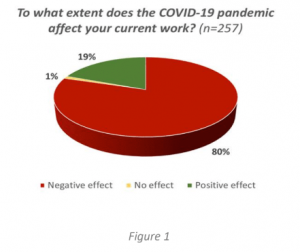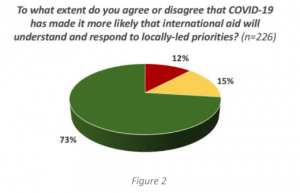How can we best understand what the realities of COVID-19 are for constituents (those we work with and for), in order to better support them through this time?
We must ask them directly.
 For an organisation to sustain trusting relationships with its partners, having further insight into the localised impact of COVID-19 and understanding how to better support partners is vital. Through May to July 2020, Keystone Accountability partnered with eight international NGOs (INGOs) to administer a free COVID-19 Impact Survey to their 280 local partners, mostly based in Sub-Saharan Africa.
For an organisation to sustain trusting relationships with its partners, having further insight into the localised impact of COVID-19 and understanding how to better support partners is vital. Through May to July 2020, Keystone Accountability partnered with eight international NGOs (INGOs) to administer a free COVID-19 Impact Survey to their 280 local partners, mostly based in Sub-Saharan Africa.
Our findings show that COVID-19 has had an adverse impact on the operations of80% of respondents (Figure 1) due to an array of issues such as loss of income, lack of access to funding, and delays in programme initiatives. As a result, 97% of respondents have either fully or partially pivoted their programmes to adapt and respond to the difficulties and opportunities that COVID-19 has elevated.
Yet, by offering focused surveys, organisations can explore exactly how best to support partnersand refocus where support is needed in the current context:
A significant ask from constituents is for organisations to continue financial support, and redirect programme funds to support COVID-19 related activities, where needed, while also understanding the potential inability of constituents to meet original funding requirements. This is important as local partners need to remain visible and proactive within the local community to harness trust and to endure high-quality programmes; this is proving difficult as most constituents have restricted access to their communities where programmes operate. There is recognition that support is needed in capacity building to adapt to operating remotely and partners are seeking further training and expertise in technical support and finding innovative solutions to community issues.
 It is also apparent that at the crux of the COVID-19 response, local organizations saw the corona moment as one that advanced localisation (Figure 2). 72% of constituents believe they have achieved more equal ways of working together with international organisations during COVID-19, and 73% suggest that the pandemic has made it more likely for the international aid sector to understand and respond to locally led priorities.
It is also apparent that at the crux of the COVID-19 response, local organizations saw the corona moment as one that advanced localisation (Figure 2). 72% of constituents believe they have achieved more equal ways of working together with international organisations during COVID-19, and 73% suggest that the pandemic has made it more likely for the international aid sector to understand and respond to locally led priorities.
So, what does this mean for the wider development sector? The corona pandemic has caused INGOs to adopt more responsive and trust-based practices. These are welcomed by local NGOs. Th opportunity now is to accelerate down this new development path.International organisations can build on new-found confidence from their partners,and demonstrate that they are accountable, by soliciting more regular and structured learning loops with their local partners. Our free corona virus survey findings confirm that mutual accountability lies in: (1) taking the pulse of ongoing operations through micro-surveys, (2) planning regular meetings on COVID-19 emergency responses, and (3) collaboratively designing contingency plans to refocus work priorities
